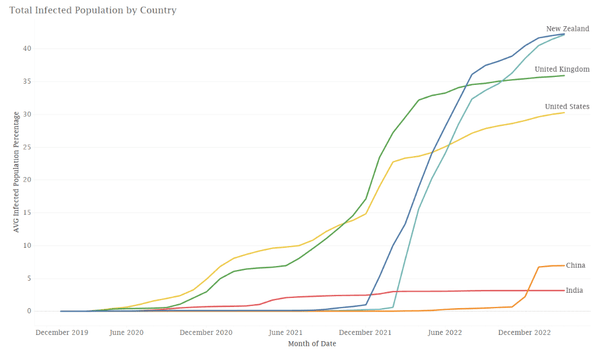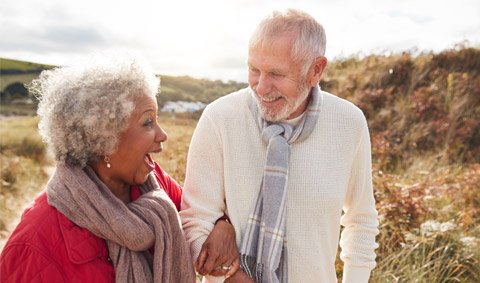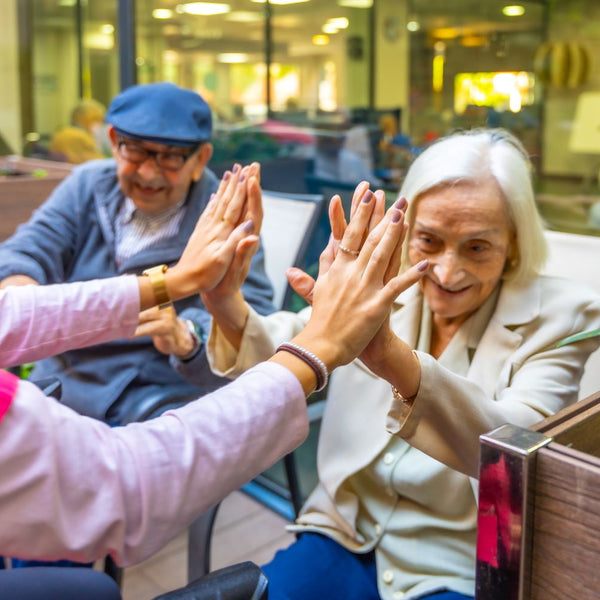With cold and flu cases becoming more common in the winter months and Covid here to stay, our care experts are recommending older people take advantage of their free flu jabs and the latest Covid vaccine to stay safe this winter.
After several years of living with the ongoing presence of Covid-19, it can be easy to overlook its continued existence and the emergence of new variants. Between December 2019 and December 2022, the United Kingdom saw a gradual increase in infected rates, shown in the graph below1, underscoring the persistence of elevated rates. The emergence of new variants remains a factor that could potentially influence infection rates as we approach December.

Alongside the ongoing Covid variants, there are new cold and flu variants emerging to think about each year, which is why elderly care experts are stressing how important it is that older people are not only getting the Covid vaccine but the flu jab too.
In 2022, excess winter deaths from flu were higher than those from COVID-19, with a recorded 140,000 deaths recorded.
It’s fantastic to hear that the NHS has already delivered more than 2.8 million flu jabs and more than one million Covid vaccines since 18th September 2023, and we want to see people, particularly older people, continuing to protect themselves.
Claire Baker
Elderly Care Expert, TakingCare Personal Alarms
Claire Baker, an elderly care expert from TakingCare Personal Alarms, said:
“With the weather set to get colder as we move into November and many older people still worrying about heating bill costs, we don’t want to see a rise in respiratory-related illnesses, like colds. Taking precautions like the flu jab can genuinely be life-changing."
“Insights show that while flu is not typically life threatening, it can be for older, more vulnerable people, with figures from the UK Health Security Agency (UKHSA) showing that deaths had increased with flu infections being higher (14,500) than the average figure (13,500) for the five years before the pandemic."
“Additionally, it's worth emphasising that the surge in fatalities can be attributed to the prevalence of the Influenza A (H3N2) strain during the 2022 to 2023 period. This subtype is known to cause more severe symptoms in older age groups, making it even more essential for the elderly population to have their flu vaccinations."
Tips to reduce winter illnesses
In addition to receiving both vaccinations, the older generation can also consider taking extra measures to reduce their risk of contracting winter illnesses.
Here are some simple ways that the older generation can look after both their physical and mental health and prevent catching any bugs are:
-
Stay active
Maintaining the activity levels during the colder months is really important, given the well-documented benefits that exercise offers for both mental and physical well-being. There are numerous methods for seniors to engage in physical activity, even when faced with long-term health conditions that may pose mobility challenges.
A simple walk to the shops will help them stay active and ensure they’re getting some fresh air, but be mindful of weather conditions and make sure they don’t stay outside in the cold for prolonged periods of time.
-
Eat healthily
It is crucial to prioritise the consumption of a well-rounded, nutritious diet among the elderly during the winter months. Incorporating items like cereals, soups, a variety of fruits and vegetables, hearty stews, and warm beverages into their meals can be easily accomplished and yields a beneficial effect on overall well-being, particularly for older individuals.
In the chillier seasons, advanced planning becomes essential, as it can be more challenging to access groceries on a daily basis so keeping a good cupboard and freezer stock of the basics is easy.
-
Stay warm
Maintaining warmth is a vital factor in warding off illnesses, as the body's ability to combat viruses is compromised when exposed to cold air infiltrating the nasal passages and airways. If your birthdate falls before 23rd September 1958, you may be eligible for a 'Winter Fuel Payment' from the government, ranging from £200 to £300, to assist with heating expenses. Further details on how to apply for this benefit can be found on the gov.uk website.
You can find more helpful advice on how to protect your loved ones against cold and flu in our seasonal advice guides.




